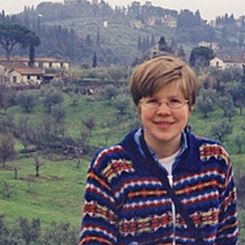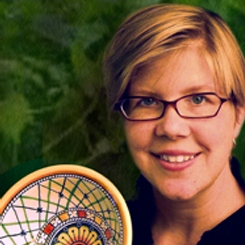Susan's current position (2009): Artist, sole proprietor of Susanna Italiana Pottery
Reason you chose this program: I knew that I wanted to be able to study abroad for a year in order to get a better feel for the country and culture and improve my Italian. I remember looking at all of the possible choices and was struck most by Bologna. I was impressed by how long the BCSP program had been running and what past participants had to say about their experience. The university has a wonderful reputation and happens to be the oldest in Europe. Bologna is also renown for its cuisine with parmesan and prosciutto coming from the region among many other things. I liked the fact that it is centrally located and well connected to other cities by train. It is a large city with a sense of community but not overrun by tourists.
Best memory: Travelling to different regions visiting museums, experiencing the different landscapes and trying the local food.
How did your study abroad program affect you personally? My family exists because of my study abroad experience and this is something I am grateful for. I met my Bolognese husband while on the program and we have a son together. At home we speak Italian and I often cook Italian meals for family and friends, trying to recreate a bit of Bologna here for them. I have been lucky to be able to live in different regions in Italy as well as Scotland. Wherever we go we always take a bit of the culture with us.
What, if any, cultural practices have you retained from your time abroad? My approach to life, family and diet has changed from my time abroad. I feel that I am more able to connect with people different from the me (the way I am) and make time for the good and important things in life. Living abroad opens your eyes to the wider world around you. It is easy to feel that you are in a strange land and everything is different but as you go on and start to gain an understanding of the place and the people you start to notice more similarities than differences. Not being a tourist allows you to absorb a life style that is different from your own. I also learned the importance of being flexible when things change and learned to adapt and respond in a positive and constructive way. Both my organizational and planning skills improved when I had to negotiate living in another culture.
Explain the impact study abroad has in the workplace: It gave me the tools I needed to run my own business and learn and apply the rich tradition of Italian maiolica pottery as an artist. Everyday I look at my family and have a constant reminder of what I gained from my experience abroad. After finishing my degree at IU, I went back to Bologna and taught English for a semester. I was interested in pursuing ceramics and was particularly drawn to Italian maiolica pottery. Everybody said I had to visit Faenza, a historical ceramic center, which is just a short 30 minute train ride from Bologna. The town was a gem, full of ceramic bottegas and is home to one of the world's largest ceramic museums Il Museo Internazionale della Ceramica to boot. I decided to apply to one of the ceramic schools, and started my training to be a professional ceramic artist in the fall. There were a lot of applicants for the program, but the fact that I was fluent in Italian (thanks to the BCSP) made a big impact. After my training I opened up my own studio in the States and started production. I also organized and guided two Italian tours for American ceramists interested in visiting Italy and training in Faenza at the same school I attended.
What advice would you have for a student considering study abroad? Considering studying abroad is the first step towards a fantastic journey. Students should not hold back out of fear of not being accepted. Leave the application decision process to the people on the board. Work with Education Abroad to learn about all of the options that are out there, speak to students who have been on the program, and learn about how credit will transfer to your major. If you have cold feet, I would encourage you to consider an Indiana University sponsored program. You can find support from other program participants and the director of the program is there on-site. If money is an issue, financial aid could be an option. Even if you are weary of their language skills, there is no better way to improve them than by full immersion.



